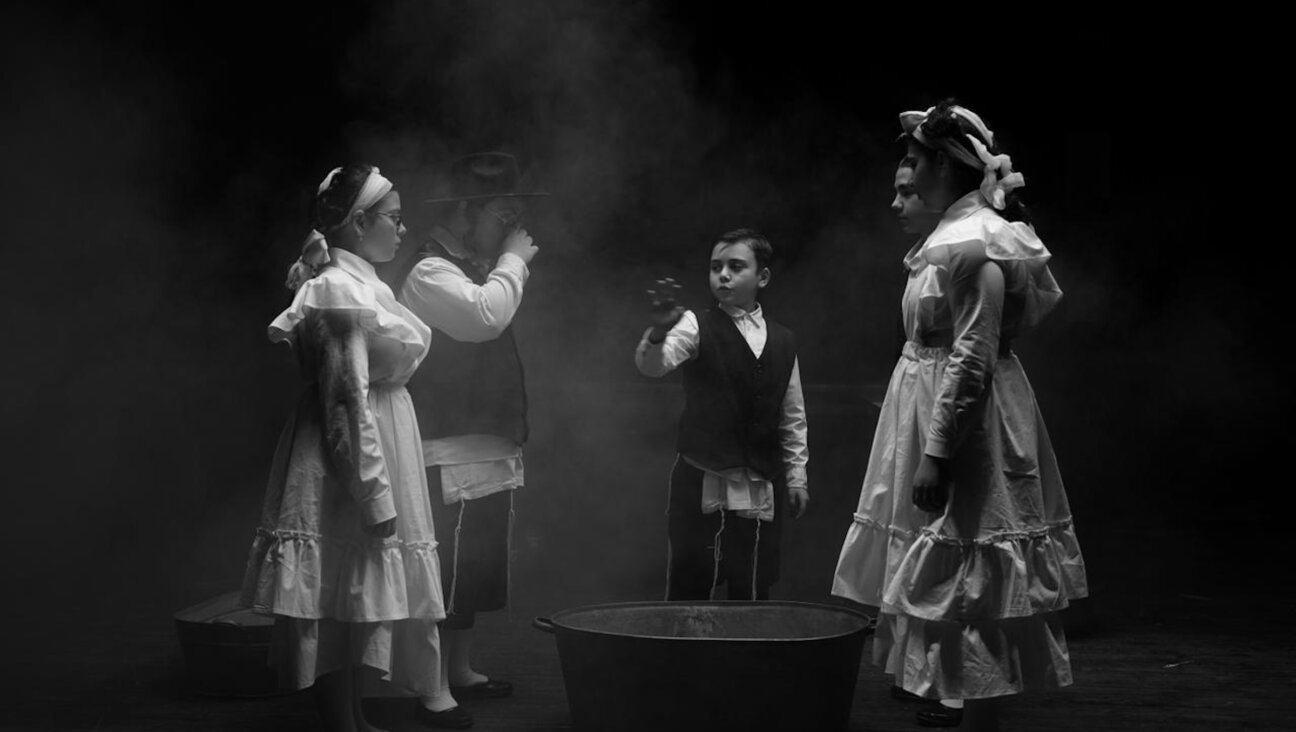The magic of Kadya Molodwsky’s children’s poetry – now in English

Graphic by Angelie Zaslavsky
Read this article in Yiddish
A new bilingual edition of Kadya Molodowsky’s enchanting Yiddish children’s poetry was recently published in Sweden. Edited and masterfully translated into English by Yaira Singer, “Through an Endless Stretch of Land” makes some of the most popular classic Yiddish children’s poetry available to a wider audience.
Kadya Molodowsky (1894-1975), a towering figure in Yiddish literature, is best known in English for her poetry for adults, in particular her devastating poem, “God of Mercy,” written in the aftermath of the Holocaust. Although she wrote acclaimed novels, short stories and journalism, before World War II she was perhaps best known in Yiddish for her children’s poetry. A longtime Yiddish and Hebrew teacher in Poland’s secular Yiddish school system, her moving “stories in verse,” as she called them, were inspired by her pupils.
Molodowsky’s children’s poems enjoyed an afterlife of sorts in Israel, where they became popular in Hebrew translation, but until now they have remained largely unknown in English. This is no surprise. Children’s poetry, with the notable exception of Dr. Seuss and a few other masters, does not have as prominent a place in English or American literature as it does in other literatures. It is also one of the hardest genres to translate.
While studying literary translation at Rutgers in 2010, I was assigned the task of translating a popular Mexican children’s song into English while maintaining the rhyme and rhythm of the original. It was like performing brain surgery with a butter knife. I told my professor that it was impossible. She laughed and said: “You can’t translate a children’s poem perfectly, but you can translate one almost perfectly.”
As luck would have it, I got to hear an “almost perfect” translation of a children’s poem a month or two later. I had helped organize an evening of Yiddish poetry in Manhattan, and one of the guests was Yaira Singer, an architect who grew up in a Yiddish-speaking home in New York. Singer read her own English translation of Kadya Molodowsky’s “The Dark Mantle,” which, impressively, had the same rhyme, rhythm and spirit as the Yiddish original. The poem, describing the fate of a family’s worn-out overcoat, transfixed me as much as it did when I first heard it in Yiddish.
What makes Singer’s translations so exceptional? Like all good translators of children’s poetry, she understands that the primary task is not to convey the meaning of the words but rather what they symbolize. In effect, a successful translator writes a new poem that serves as a reincarnation of the first, using words that were foreign to the original poet. The problem is that for a poet, words themselves are the blocks with which she builds her art. A translator acts as a diplomat, negotiating with the language of the first poem to ensure that the new poem stands on its own and captures the intent of the original.
This kind of poetic diplomacy can be seen in the following stanza from Molodowsky’s “The Dark Mantle.” To make the translation easier to appreciate, I have given the original Yiddish and a literal translation, followed by Singer’s English version.
“kh’hob fun im dem rekhtn lats
opgeshenkt der shvartser kats
un dernokh dem linkn lats
opgeshenkt der vayser kats
un di resht, lokh nokh lokh
vet onkumen di tsveyte vokh
The right lapel from him I
gifted the black cat
and then the left lapel
gifted the white cat
and the rest, hole after hole
will arrive next week.
In Singer’s translation that comes out to:
I tore the right sleeve with delight
And fed it to the cat that’s white
The left sleeve came off with a whack
Got eaten by the cat that’s black
I gave remaining shabby scraps
To two stray dogs and seven rats.
Although the translation substitutes the word lapels for sleeves and no rats appear in the original, the English perfectly echoes the spirit of Molodowsky’s Yiddish. Even the word “rats” serves as an acoustic reverberation of the Yiddish word “lats” (lapel).
While reading Molodowsky’s Yiddish poems to her three children in Yiddish, Singer felt “discontent” knowing that most Jewish families couldn’t read them. These poems, she writes in her introduction, bring to life the world of Eastern-European Jewry with its humor, irony and deeply-rooted Yidishkayt.
Thanks to Singer’s translations, many more families will have the opportunity to enjoy Molodowsky’s whimsical stories in verse, like “Olka, her Doll, and Her Navy Parasol” and “The Dame and the Dane,” and to explore the world of the Eastern-European Jewish children who inspired them.

















